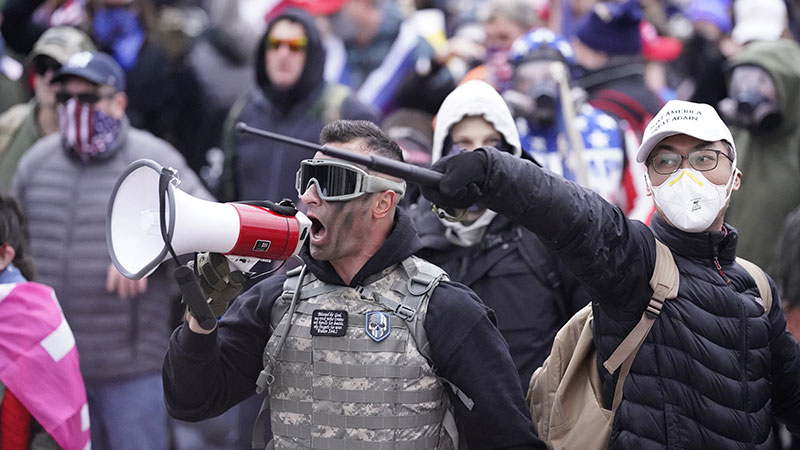The days between now and Jan. 20 will feel like some of the longest and shortest of our lives. We live with uncertainty, fear and a palpable amount of dread—about what President Trump may do, about the actions of those who have been radicalized by his ideas and words, and about the feckless elected leaders who seemingly have enabled this destruction of fundamental American ideals for personal or political benefit.
This “god-awful display,” as President-elect Joe Biden called the Capitol riots, reflects the culmination of many institutional failures. These failures allowed elected government officials, law enforcement, right-wing broadcasters and activists, social media companies and many others to encourage or at best stand uselessly by during the assault on our democratic system.
It’s small comfort to know, but the fact is, it’s not just us. We’ve seen this trend toward authoritarianism around the world. So-called “strongman” leaders—who are really weak in their moral principles and character—and their supporters demand conformity, using the tools of propaganda and fear. Fear of change. Fear of loss. Fear of the other.
People whose economic security and personal well-being are threatened make the best audiences for this. It’s no coincidence that in the United States, the ranks of the violently aggrieved have swollen as middle-class opportunities and economic mobility have shrunk.
The “obliteration of the truth,” as several commentators have noted, has been present from Day One. Remember the bizarre debate about the size of the 2017 inauguration crowd? Over four years, the lies—and support for them—have grown, as has the overtly racist framing of America’s challenges.
The COVID-19 pandemic has accelerated this trend, as it has so many others: A president who called the health crisis a hoax and his enablers from fringe media who created bubbles of disinformation helped the pandemic to spread. And, like a virus leaping from one population to the next, the lies jumped again, from false COVID claims to bogus charges of election fraud.
There are two terribly uncomfortable truths here. First, the falsehoods are being intentionally targeted at the people who have been denied opportunities for education or been misled about its benefits. This is confirmed in the World Values Survey, which found that in the United States, 44 percent of those without college degrees approved of having a strong leader unchecked by elections.
This has been true for a while—a sign of the long-term damage that has been done because of poor access to and understanding of education’s individual and societal benefits. “Well before Trump, a substantial and striking education gap can be observed in American approval of authoritarian leaders,” writes Pippa Norris of Harvard University, co-author with Ronald Inglehart of “Cultural Backlash: Trump, Brexit and Authoritarian Populism.”
Worse yet, a startling percentage of Americans say they believe “a military coup could be justified when there is a lot of corruption.”
Second, we also have to deal with the uncomfortable fact that the vast majority of the 147 members of Congress who voted to deny facts and failed to certify election results in several states AFTER the attempted coup took place are college educated—some with distinguished legal pedigrees. The fact is, education on its own can’t stop people from being dishonest, in large part because education can’t singularly insulate people from the echo chambers and confirmation bias inherent in our world today.
We know, however, that overall support for democracy increases with education on a macro level. As one study found, “Schooling teaches people to interact with others and raises the benefits of civic participation, including voting and organizing.” This is the fundamental idea of active citizenship, of the notion that being a citizen isn’t who you are, it’s what you do.
This tracks with what we see around us: As we cultivate our capacity for learning, working, and serving, we’re more likely to vote, volunteer, contribute to charity and participate in society generally. This means that education and training foster not only greater economic security, but the critical thinking and ethical decision-making that help people resist disinformation—and promote free expression, freedom, and opportunity.
We need these traits for the country’s future in a fast-changing economic world driven by technological change. In the age of smart machines, automation, and artificial intelligence, our success as a nation depends on growing our capacity for “human work,” the work that only people can do. As it happens, the same very human qualities of critical thinking, problem solving, and cooperation are predictors both of economic success and democratic stability.
Ultimately, human work offers meaning and purpose; it gives people a chance for individual and shared prosperity. When we imagine a future lit by the promise of economic security and the rejection of fear, we’re picturing a society that rejects mob rule—as it should. Fixing our broken system will lead to greater prosperity overall, helping to address growing income inequality, erosion of the middle class, deaths of despair and numerous social pathologies.
As Biden said in the immediate aftermath of the Capitol calamity: “We are better than this.”
Honestly, it’s not clear that we are—right now—better than this. But we must be. And we can prove it by emphasizing the education and training that promotes active citizenship, human work and the democratic values that have always been who we are as a nation.
Jamie Merisotis is president and CEO of Lumina Foundation and author of “Human Work in the Age of Smart Machines.”
